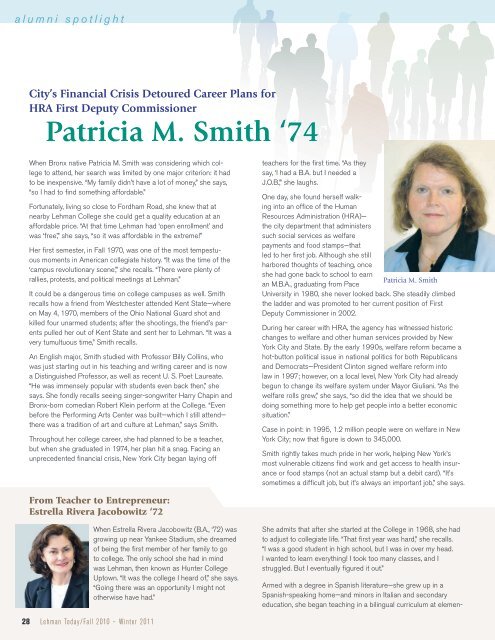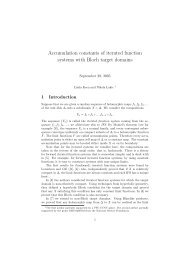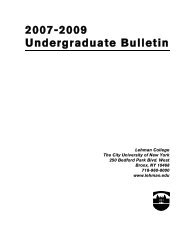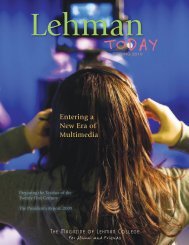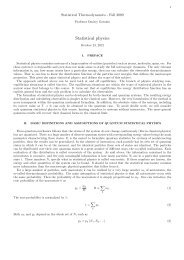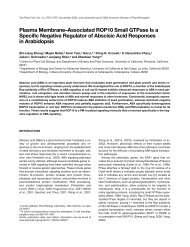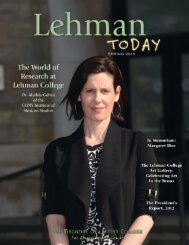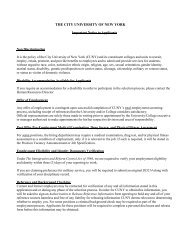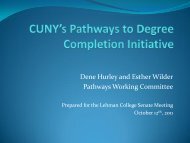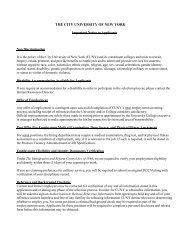Fall 2010 - Lehman College
Fall 2010 - Lehman College
Fall 2010 - Lehman College
You also want an ePaper? Increase the reach of your titles
YUMPU automatically turns print PDFs into web optimized ePapers that Google loves.
a l u m n i s p o t l i g h t<br />
City’s Financial Crisis Detoured Career Plans for<br />
HRA First Deputy Commissioner<br />
Patricia M. Smith ‘74<br />
When Bronx native Patricia M. Smith was considering which college<br />
to attend, her search was limited by one major criterion: it had<br />
to be inexpensive. “My family didn’t have a lot of money,” she says,<br />
“so I had to find something affordable.”<br />
Fortunately, living so close to Fordham Road, she knew that at<br />
nearby <strong>Lehman</strong> <strong>College</strong> she could get a quality education at an<br />
affordable price. “At that time <strong>Lehman</strong> had ‘open enrollment’ and<br />
was ‘free’,” she says, “so it was affordable in the extreme!”<br />
Her first semester, in <strong>Fall</strong> 1970, was one of the most tempestuous<br />
moments in American collegiate history. “It was the time of the<br />
‘campus revolutionary scene’,” she recalls. “There were plenty of<br />
rallies, protests, and political meetings at <strong>Lehman</strong>.”<br />
It could be a dangerous time on college campuses as well. Smith<br />
recalls how a friend from Westchester attended Kent State—where<br />
on May 4, 1970, members of the Ohio National Guard shot and<br />
killed four unarmed students; after the shootings, the friend’s parents<br />
pulled her out of Kent State and sent her to <strong>Lehman</strong>. “It was a<br />
very tumultuous time,” Smith recalls.<br />
An English major, Smith studied with Professor Billy Collins, who<br />
was just starting out in his teaching and writing career and is now<br />
a Distinguished Professor, as well as recent U. S. Poet Laureate.<br />
“He was immensely popular with students even back then,” she<br />
says. She fondly recalls seeing singer-songwriter Harry Chapin and<br />
Bronx-born comedian Robert Klein perform at the <strong>College</strong>. “Even<br />
before the Performing Arts Center was built—which I still attend—<br />
there was a tradition of art and culture at <strong>Lehman</strong>,” says Smith.<br />
Throughout her college career, she had planned to be a teacher,<br />
but when she graduated in 1974, her plan hit a snag. Facing an<br />
unprecedented financial crisis, New York City began laying off<br />
teachers for the first time. “As they<br />
say, ‘I had a B.A. but I needed a<br />
J.O.B.’,” she laughs.<br />
One day, she found herself walking<br />
into an office of the Human<br />
Resources Administration (HRA)—<br />
the city department that administers<br />
such social services as welfare<br />
payments and food stamps—that<br />
led to her first job. Although she still<br />
harbored thoughts of teaching, once<br />
she had gone back to school to earn<br />
Patricia M. Smith<br />
an M.B.A., graduating from Pace<br />
University in 1980, she never looked back. She steadily climbed<br />
the ladder and was promoted to her current position of First<br />
Deputy Commissioner in 2002.<br />
During her career with HRA, the agency has witnessed historic<br />
changes to welfare and other human services provided by New<br />
York City and State. By the early 1990s, welfare reform became a<br />
hot-button political issue in national politics for both Republicans<br />
and Democrats—President Clinton signed welfare reform into<br />
law in 1997; however, on a local level, New York City had already<br />
begun to change its welfare system under Mayor Giuliani. “As the<br />
welfare rolls grew,” she says, “so did the idea that we should be<br />
doing something more to help get people into a better economic<br />
situation.”<br />
Case in point: in 1995, 1.2 million people were on welfare in New<br />
York City; now that figure is down to 345,000.<br />
Smith rightly takes much pride in her work, helping New York’s<br />
most vulnerable citizens find work and get access to health insurance<br />
or food stamps (not an actual stamp but a debit card). “It’s<br />
sometimes a difficult job, but it’s always an important job,” she says.<br />
From Teacher to Entrepreneur:<br />
Estrella Rivera Jacobowitz ‘72<br />
When Estrella Rivera Jacobowitz (B.A., ‘72) was<br />
growing up near Yankee Stadium, she dreamed<br />
of being the first member of her family to go<br />
to college. The only school she had in mind<br />
was <strong>Lehman</strong>, then known as Hunter <strong>College</strong><br />
Uptown. “It was the college I heard of,” she says.<br />
“Going there was an opportunity I might not<br />
otherwise have had.”<br />
She admits that after she started at the <strong>College</strong> in 1968, she had<br />
to adjust to collegiate life. “That first year was hard,” she recalls.<br />
“I was a good student in high school, but I was in over my head.<br />
I wanted to learn everything! I took too many classes, and I<br />
struggled. But I eventually figured it out.”<br />
Armed with a degree in Spanish literature—she grew up in a<br />
Spanish-speaking home—and minors in Italian and secondary<br />
education, she began teaching in a bilingual curriculum at elemen-<br />
28 <strong>Lehman</strong> Today/<strong>Fall</strong> <strong>2010</strong> – Winter 2011


